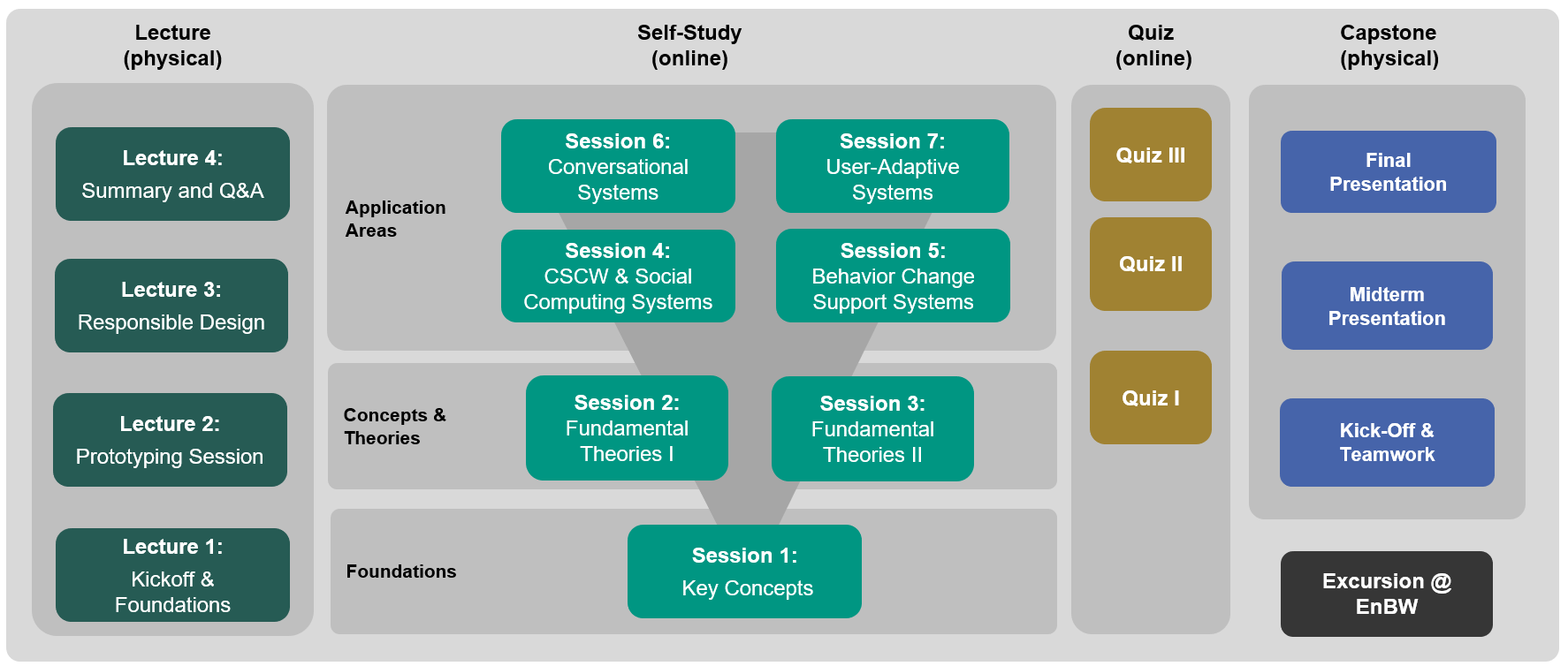Designing Interactive Systems
- Type: Lecture (V)
- Semester: SS 2023
-
Time:
We 2023-04-19
14:00 - 15:30, weekly
05.20 1C-04
05.20 Kollegiengebäude am Kronenplatz
We 2023-04-26
14:00 - 15:30, weekly
05.20 1C-04
05.20 Kollegiengebäude am Kronenplatz
We 2023-05-03
14:00 - 15:30, weekly
05.20 1C-04
05.20 Kollegiengebäude am Kronenplatz
We 2023-05-10
14:00 - 15:30, weekly
05.20 1C-04
05.20 Kollegiengebäude am Kronenplatz
We 2023-05-17
14:00 - 15:30, weekly
05.20 1C-04
05.20 Kollegiengebäude am Kronenplatz
We 2023-05-24
14:00 - 15:30, weekly
05.20 1C-04
05.20 Kollegiengebäude am Kronenplatz
We 2023-06-07
14:00 - 15:30, weekly
05.20 1C-04
05.20 Kollegiengebäude am Kronenplatz
We 2023-06-14
14:00 - 15:30, weekly
05.20 1C-04
05.20 Kollegiengebäude am Kronenplatz
We 2023-06-21
14:00 - 15:30, weekly
05.20 1C-04
05.20 Kollegiengebäude am Kronenplatz
We 2023-06-28
14:00 - 15:30, weekly
05.20 1C-04
05.20 Kollegiengebäude am Kronenplatz
We 2023-07-05
14:00 - 15:30, weekly
05.20 1C-04
05.20 Kollegiengebäude am Kronenplatz
We 2023-07-12
14:00 - 15:30, weekly
05.20 1C-04
05.20 Kollegiengebäude am Kronenplatz
We 2023-07-19
14:00 - 15:30, weekly
05.20 1C-04
05.20 Kollegiengebäude am Kronenplatz
We 2023-07-26
14:00 - 15:30, weekly
05.20 1C-04
05.20 Kollegiengebäude am Kronenplatz
-
Lecturer:
Dr. Ulrich Gnewuch
Julia Seitz
Prof. Dr. Alexander Mädche
- SWS: 3
- Lv-No.: 2540558
- Information: Blended (On-Site/Online)
Lecture Description
Computers have evolved from batch processors towards highly interactive systems. This offers new possibilities but also challenges for the successful design of the interaction between human and computer. Interactive system are socio-technical systems in which users perform tasks by interacting with technology in a specific context in order to achieve specified goals and outcomes.
The aim of this course is to introduce advanced concepts and theories, interaction technologies as well as current practice of contemporary interactive systems. The course is complemented with a design capstone project, where students in a team select and apply design methods & techniques in order to create an interactive prototype.
Lecture Objectives
- Understand what interactive systems are and how they can be conceptualized
- Explore theoretical foundations that guide the design of interactive systems (e.g., theories from reference disciplines such as psychology or human-human communication)
- Know key concepts and design principles of specific classes of interactive systems (e.g. CSCW & Social Computing, Behavior Change Systems, Conversational Agents, and User-Adaptive Systems)
- Get hands-on experience by applying lecture content in a design capstone project.
Capstone Project
The students analyse a real-world challenge provided by our partner EnBW AG and design innovative prototypes based on the lecture content. Students do not only gain hands-on experience with various prototyping tools, but can also improve their project management and collaboration skills.
For a detailed insight into previous students work, you can watch the videos of all prototypes on our Youtube-Channel.
Registration & Organization
Please note: This course is limited to a capacity of 50 places. The capacity limitation is due to the attractive format of the accompanying capstone project. Students have to apply with their CV and transcript of records via Yousubscribe after the kickoff session. The capstone project is a group assignment, students are allocated to teams based on their skills and preferences. The language of instruction is English. Further organizational details of the lecture and the capstone project will be presented in the kick-off session of the lecture.
More information (e.g. schedule for lecture and exercises, zoom links) will be posted in advance in the ILIAS course of the lecture.
Literature
- Benyon, D. (2014). Designing interactive systems: A comprehensive guide to HCI, UX and interaction design (3. ed.). Harlow: Pearson.
- Dix, A., Dix, A. J., Finlay, J., Abowd, G. D., & Beale, R. (2003). Human-computer interaction. Pearson Education.
Further literature will be made available in the lecture.


